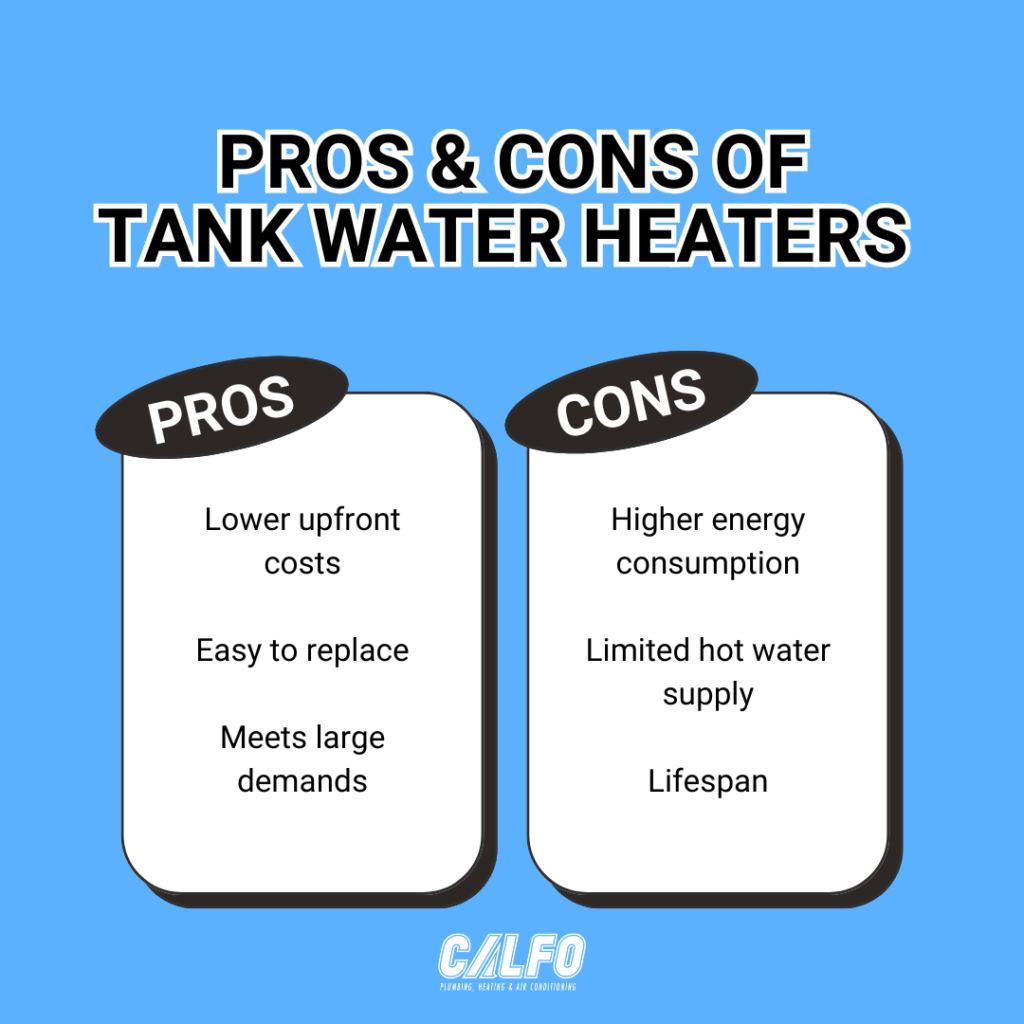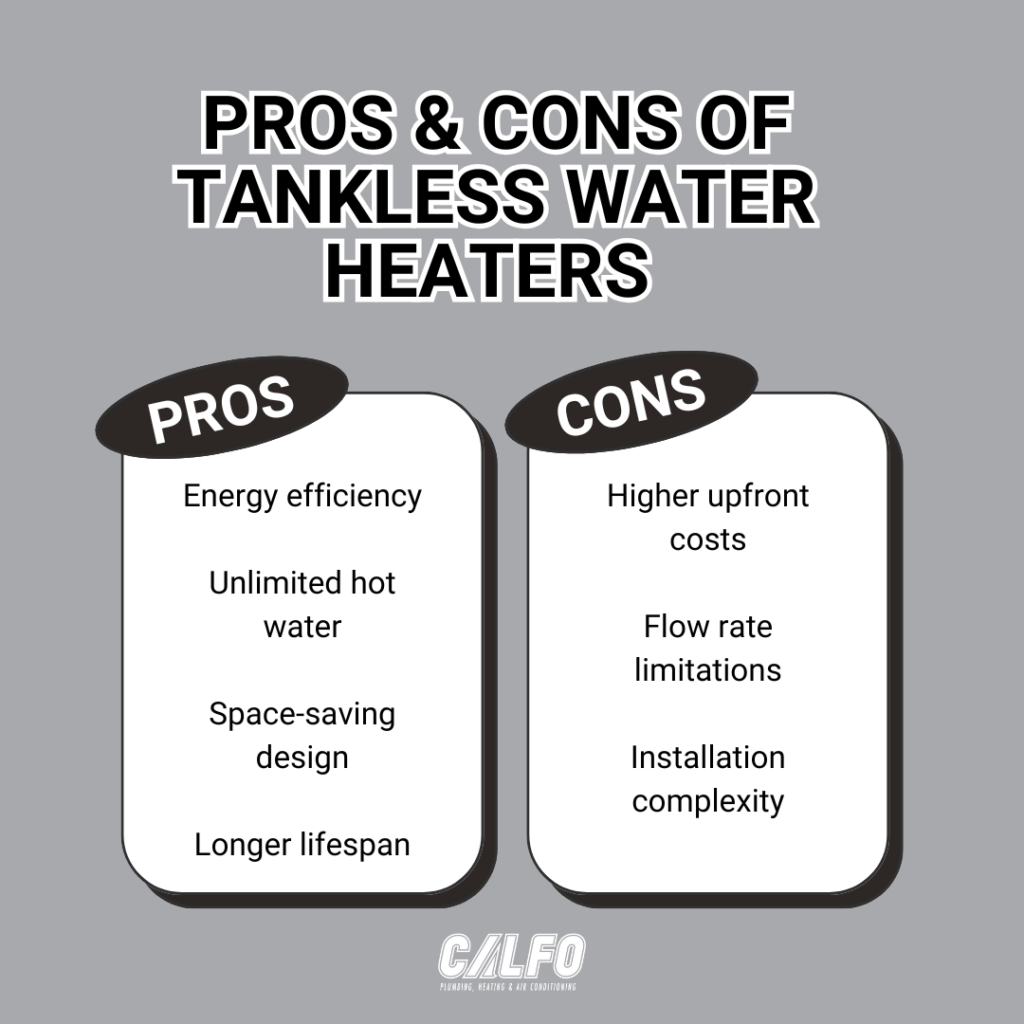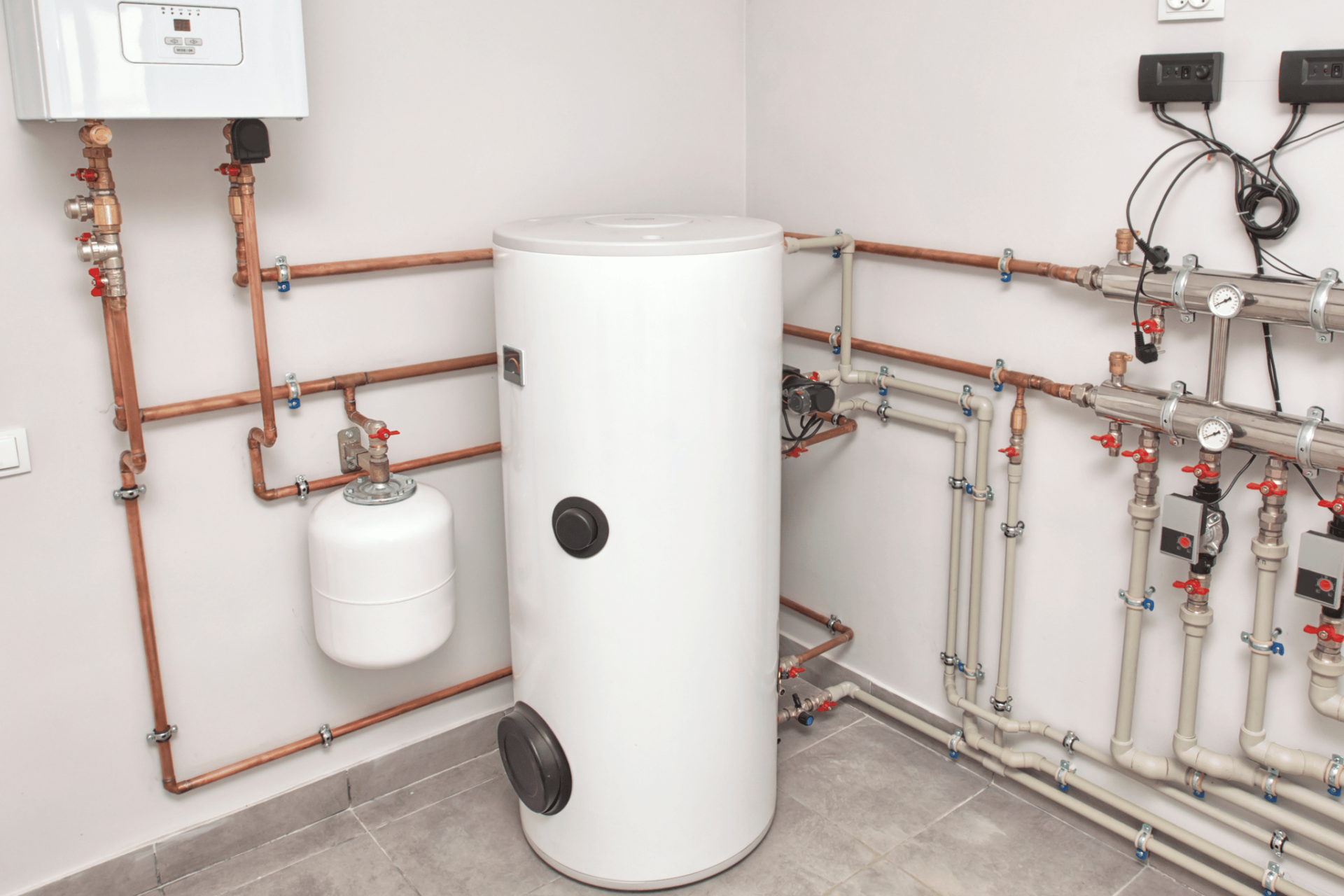Choosing between a tank and a tankless water heater can be a tough decision for homeowners in Pittsburgh. Both options have their pros and cons, and what’s right for your home depends on several factors. In this blog, we’ll break down the differences between tank and tankless water heaters and help you decide which option is the best for your needs.
Understanding the Basics of Tank and Tankless Water Heaters
What Is a Tank Water Heater?
A tank water heater is the traditional type of water heating system. It stores a large amount of water in a tank, heating and reheating it to ensure a constant supply of hot water. In Pittsburgh homes, these tanks typically hold between 40 and 60 gallons of water and take up a decent amount of space in basements or utility rooms.
Tank Water Heater Options
1. Conventional Storage Tank Water Heaters
This is the most common type of water heater, which stores a large amount of water (typically between 30 to 80 gallons) and keeps it heated until it is needed. The water in the tank is continuously heated to maintain the desired temperature.
- Energy Source: Can be powered by electricity, natural gas, propane, or fuel oil.
- Pros: Provides a steady supply of hot water and is widely available.
- Cons: Higher energy consumption due to the constant reheating of water.
2. Heat Pump (Hybrid) Water Heaters
A heat pump water heater uses electricity to move heat from the air or ground into the water tank rather than directly generating heat. This makes it a more energy-efficient option compared to conventional models.
- Energy Source: Electricity.
- Pros: Highly energy-efficient, can save homeowners money on energy bills.
- Cons: Higher upfront cost and may not perform well in colder climates (like Pittsburgh) without proper insulation or supplemental heating.
3. Solar Water Heaters
Solar water heaters use energy from the sun to heat water. A solar collector, typically installed on the roof, absorbs solar energy, which is then transferred to the water stored in a tank. This type is best suited for areas with plenty of sunlight but often comes with a backup system for cloudy days.
- Energy Source: Solar energy (with electric or gas backup).
- Pros: Environmentally friendly and can significantly reduce energy bills.
- Cons: High installation costs and reduced efficiency in areas with limited sunlight or harsh winters.
4. Indirect Water Heaters
Indirect water heaters use the home’s heating system to heat water. The boiler or furnace heats a fluid that circulates through a heat exchanger in the water heater’s storage tank, heating the water. This type of heater relies on the existing heating system, meaning it only operates when the heating system is running.
- Energy Source: Gas, oil, or electric boiler.
- Pros: Energy-efficient when paired with a high-efficiency boiler or furnace.
- Cons: Dependent on the home’s heating system; not ideal for homes that don’t have an existing boiler or furnace.
5. High-Efficiency Gas Storage Water Heaters
These are conventional gas water heaters but built with improved insulation and energy-saving features to boost efficiency. They use less gas and heat water faster than standard gas water heaters.
- Energy Source: Natural gas or propane.
- Pros: More energy-efficient than standard gas models.
- Cons: Higher upfront cost but offers long-term savings on gas bills.
6. Condensing Water Heaters
A condensing water heater works similarly to a conventional gas water heater but captures and recycles the heat from the exhaust gases, making it much more energy-efficient. The water is stored in a tank, but less energy is required to heat it because of this process.
- Energy Source: Natural gas or propane.
- Pros: Highly efficient and uses less energy.
- Cons: Higher upfront cost and limited availability in certain markets.
What Is a Tankless Water Heater?
Tankless water heaters, also known as on-demand water heaters, don’t store water. Instead, they heat water as it passes through the unit, providing an endless supply of hot water whenever you need it. This makes tankless models much more compact than their tank counterparts, which is ideal for homes with limited space.
1. Electric Tankless Water Heaters
Electric tankless water heaters use electricity to heat the water directly. When water flows through the unit, an electric heating element quickly heats the water before it reaches your taps.
- Pros:
- Compact and easy to install.
- No venting required (unlike gas units).
- Lower upfront cost compared to gas tankless systems.
- Cons:
- May require electrical upgrades to support the power demand.
- Less efficient in cold climates (like Pittsburgh), where water temperatures are lower.
- May struggle to supply large homes with sufficient hot water during peak demand.
2. Gas-Powered Tankless Water Heaters
Gas tankless water heaters use either natural gas or propane to heat the water. These systems have a burner that heats the water as it flows through the unit, providing an endless supply of hot water.
- Pros:
- Provides higher flow rates compared to electric units, making them ideal for larger households.
- More energy-efficient than traditional gas storage water heaters.
- Works well in colder climates.
- Cons:
- Higher installation cost.
- Requires venting to safely expel exhaust gases.
- May require a natural gas line or propane storage.
3. Condensing Tankless Water Heaters
Condensing tankless water heaters capture and recycle heat from exhaust gases, making them more energy-efficient than standard gas tankless models. They extract additional heat from the exhaust before releasing it outside, which means less energy is wasted.
- Pros:
- More energy-efficient, especially for high-demand homes.
- Lower operating costs due to increased efficiency.
- Ideal for eco-conscious homeowners looking to reduce their carbon footprint.
- Cons:
- More expensive to purchase and install.
- Requires venting, similar to other gas-powered units.
4. Non-Condensing Tankless Water Heaters
Non-condensing tankless water heaters heat water and vent the combustion gases outside immediately. They don’t capture extra heat like condensing models, but they are still more energy-efficient than traditional tank water heaters.
- Pros:
- More affordable than condensing models.
- Still highly efficient compared to tank water heaters.
- Smaller in size and easier to install.
- Cons:
- Less efficient than condensing tankless heaters.
- Requires venting for exhaust gases.
- May result in higher long-term energy costs.
5. Point-of-Use Tankless Water Heaters
These compact tankless units are installed close to the water source, such as under a sink or near a shower. They provide instant hot water to specific fixtures without needing to heat water for the entire home.
- Pros:
- Instant hot water for specific locations.
- Reduces water wastage since there’s no need to wait for water to heat.
- Very energy-efficient for small, localized use.
- Cons:
- Limited capacity, typically only serves one fixture at a time.
- May need multiple units for whole-home use.
6. Whole-House Tankless Water Heaters
Whole-house tankless systems are designed to provide hot water for the entire home, heating water on demand as it flows through the system. These are larger, more powerful units that can supply multiple fixtures simultaneously.
- Pros:
- Ideal for larger homes with high hot water demand.
- Can supply hot water to multiple fixtures at once without running out.
- Energy-efficient for whole-home water heating.
- Cons:
- More expensive than point-of-use models.
- May require professional installation and possible upgrades to gas or electrical systems.
Pros and Cons of Tank Water Heater

Benefits of a Tank Water Heater
- Lower upfront costs: Tank water heaters are generally less expensive to purchase and install than tankless models, making them more budget-friendly upfront.
- Easy to replace: Since tank water heaters are common in Pittsburgh homes, replacing an old one is typically a straightforward process.
- Meets large demands: A tank system can supply hot water to multiple fixtures at once, making it a good option for large families.
Drawbacks of a Tank Water Heater
- Higher energy consumption: Because the water is constantly heated and reheated in the tank, this type of system uses more energy, which can increase your utility bills over time.
- Limited hot water supply: Once the hot water in the tank is used up, you’ll have to wait for it to refill and reheat.
- Lifespan: Tank water heaters generally last around 10–15 years, which is shorter than the lifespan of tankless units.
Pros and Cons of Tankless Water Heaters

Advantages of a Tankless Water Heater
- Energy efficiency: Tankless water heaters only heat water when you need it, which can significantly reduce energy use and lower your monthly bills.
- Unlimited hot water: Since the water is heated on-demand, you’ll never run out of hot water, no matter how long your shower lasts.
- Space-saving design: Tankless units are much smaller than traditional water heaters, freeing up valuable storage space in your home.
- Longer lifespan: Tankless water heaters can last up to 20 years or more with proper maintenance.
Potential Downsides of a Tankless Water Heater
- Higher upfront costs: Tankless models tend to be more expensive to purchase and install, which can be a drawback for homeowners on a tight budget.
- Flow rate limitations: While tankless water heaters provide continuous hot water, they may struggle to supply multiple fixtures simultaneously in larger homes.
- Installation complexity: Depending on your home’s existing plumbing and electrical setup, installing a tankless system may require additional modifications, increasing the overall cost.
Key Factors to Consider for Pittsburgh Homes
Energy Efficiency in Pittsburgh’s Climate
Pittsburgh’s cold winters can put a strain on any water heater. Tankless units are generally more energy-efficient, but during frigid months, they may take a bit longer to heat water. On the other hand, tank water heaters work consistently but use more energy to maintain the desired water temperature. If energy efficiency is your priority, a tankless system could be the better option.
Installation Costs and Space Requirements
Tankless water heaters save space, but they come with higher installation costs. In older Pittsburgh homes with limited utility space, the compact size of a tankless unit might be appealing. However, keep in mind that installing a tankless heater may require new electrical wiring or gas lines, increasing the overall cost. If your home has ample space and you prefer a more affordable installation, a traditional tank water heater might be better suited.
Hot Water Demand and Household Size
If you have a large family or frequently run multiple hot water fixtures at the same time, a tank water heater may be the more practical option. With a properly sized tank, you can have multiple people showering, washing dishes, and doing laundry without running out of hot water. However, if your household has a smaller demand for hot water, a tankless heater might provide all the hot water you need without wasting energy.
Which Water Heater Is Right for You?
Best Choice for Energy Savings
For homeowners looking to cut down on energy bills and reduce their environmental footprint, a tankless water heater is likely the better option. It heats water only when needed, resulting in lower energy consumption over time.
Best Choice for Hot Water on Demand
If your family frequently uses multiple hot water fixtures at once, a tank water heater may be more reliable in consistently meeting that demand. However, a properly sized tankless system could work well for smaller households with moderate water usage.
Long-Term Costs and Maintenance
Though a tankless system has a higher upfront cost, its longer lifespan and energy efficiency can make it a better investment in the long run. Tank water heaters, while cheaper to install, may need to be replaced more frequently and come with higher energy bills over time.
How Calfo Home Services Can Help You Choose
Expert Water Heater Installation in Pittsburgh
At Calfo Home Services, we understand that choosing the right water heater can be overwhelming. Our experienced team can help you assess your household’s hot water needs, budget, and space to recommend the best system for your home.
Professional Guidance for Your Water Heater Decision
Whether you’re leaning towards a tank or tankless system, we’ll walk you through every step of the decision-making process. From choosing the right model to expert installation, Calfo Home Services is here to ensure your Pittsburgh home has reliable, energy-efficient hot water year-round.
The decision between a tank and tankless water heater for your Pittsburgh home depends on your specific needs, budget, and household size. Whether you prioritize energy efficiency, space, or cost, Calfo Home Services is here to guide you in making the best choice for your family. Contact us today for a consultation!

